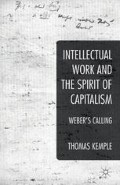Abstract
Like many of the early social scientists, including Marx, Durkheim, and Freud, Weber was expected to become a lawyer before he eventually committed himself to the academic life. In fact, though, he carried many of the methods of legal inquiry and skills of argumentation that he learned as a law student over into his teaching and research, among them an appreciation of the authority of precedent; a respect for the freedom of discretionary thought within the boundaries of applied rules; the use of counterfactual speculation and thought-experimentation within the logic of argumentation; a rigorous use of definitions or even a syllogistic interpretation of norms; and a selective appeal to evidence in support of or against a specific case. As a young acquaintance, Arthur Salz, wrote shortly after Weber died, a certain juridical spirit or legal charisma animated all of his written and spoken words. Drawing from Salz’s portrait, I want to expand upon this theme of the conscientious judge as value-free sociologist. In Weber’s case, this image of the open-minded yet partial lawyer as social thinker invites us to consider what it means not just to read Weber but to ‘voice’ the questions that he posed and to reassess the problems that he raised in our own way. As Stephen Turner and Regis Factor (1994) point out, and as Weber himself suggested in a essay from 1913 (CMW:281), interpretive sociology is not just a scientific procedure or an aesthetic intuition guided by tact (Takt) on the part of the scholar, but also a strategic intervention into contemporary intellectual disputes over the meaningful relationship between reason and value.
One cannot understand Max Weber’s scientific oeuvre as a whole if one does not feel, or cannot ‘envision’, first, that every line he has written is really one that has been spoken, and secondly, that everything which he undertakes in his scientific work is a priori conceived in a juridical spirit. His gifts were specifically rhetorical and juridical-constructive. The living word, stirring speech, not dead letters, was the tool with which he worked, and casuistry, not conceptual subsumption, the form in which his thinking instinctively clothed itself. This ethos and pathos of his coloured the whole of his scientific work. He treats his subject matter with an advocate’s passionate commitment to the cause of his client and with the cool, dispassionate tranquility, conscientiousness and politeness of a judge whose sole purpose is to apply the law.
(Salz, 1989:55)
Access this chapter
Tax calculation will be finalised at checkout
Purchases are for personal use only
Preview
Unable to display preview. Download preview PDF.
Author information
Authors and Affiliations
Copyright information
© 2014 Thomas Kemple
About this chapter
Cite this chapter
Kemple, T. (2014). Casuistic Disciplines of Capitalist Science: Weber’s Bifocals. In: Intellectual Work and the Spirit of Capitalism. Palgrave Macmillan, London. https://doi.org/10.1057/9781137377142_3
Download citation
DOI: https://doi.org/10.1057/9781137377142_3
Publisher Name: Palgrave Macmillan, London
Print ISBN: 978-1-349-47792-0
Online ISBN: 978-1-137-37714-2
eBook Packages: Palgrave Social Sciences CollectionSocial Sciences (R0)

